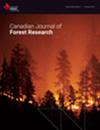气候变化影响和魁北克森林潜在适应途径的区域综合评估
IF 1.5
3区 农林科学
Q2 FORESTRY
引用次数: 2
摘要
评估森林生态系统和森林部门对气候变化的脆弱性的区域分析是考虑气候变化影响的异质性以及风险、机遇和适应能力可能因区域而异的关键。在这里,我们提供了魁北克森林气候变化区域综合评估,这项工作涉及多个研究团队,重点关注气候变化对魁北克商业森林的影响和潜在的适应解决方案。我们的研究表明,气候变化将改变魁北克森林中的几个生态过程。这些变化将导致森林景观的重要变化。收获将随着气候变化的影响而累积,进一步改变未来的森林景观,这也将对野生动物栖息地(包括林地驯鹿栖息地)、鸟类生物多样性、碳预算和土著人民的各种森林景观价值产生影响。森林部门的适应对于减轻气候变化对森林生态系统商品和服务的影响并提高其复原力至关重要。今后,应探索广泛的适应措施,特别是通过降低收成水平,以帮助在社会、生态和经济价值之间取得平衡。我们得出的结论是,如果没有气候适应,强烈的负面经济和生态影响可能会影响魁北克的森林。本文章由计算机程序翻译,如有差异,请以英文原文为准。
A regional integrated assessment of the impacts of climate change and of the potential adaptation avenues for Quebec’s forests
Regional analyses assessing the vulnerabilities of forest ecosystems and the forest sector to climate change are key to consider the heterogeneity of climate change impacts but also the fact that risks, opportunities and adaptation capacities might differ regionally. Here we provide the Regional Integrated Assessment of climate change on Quebec’s forests, a work that involved several research teams and that focused on climate change impacts on Quebec’s commercial forests and on potential adaptation solutions. Our work showed that climate change will alter several ecological processes within Quebec’s forests. These changes will result in important modifications in forest landscapes. Harvest will cumulate with climate change effects to further alter future forest landscapes which will also have consequences on wildlife habitat (including woodland caribou habitat), avian biodiversity, carbon budget and a variety of forest landscape values for Indigenous peoples. The adaptation of the forest sector, will be crucial to mitigate the impacts of climate change on forest ecosystem goods and services and improve their resilience. Moving forward, a broad range of adaptation measures, notably through reducing harvest levels, should be explored to help strike a balance among social, ecological and economic values. We conclude that without climate adaptation strong negative economical and ecological impacts will likely affect Quebec’s forests.
求助全文
通过发布文献求助,成功后即可免费获取论文全文。
去求助
来源期刊
CiteScore
4.20
自引率
9.10%
发文量
109
审稿时长
3 months
期刊介绍:
Published since 1971, the Canadian Journal of Forest Research is a monthly journal that features articles, reviews, notes and concept papers on a broad spectrum of forest sciences, including biometrics, conservation, disturbances, ecology, economics, entomology, genetics, hydrology, management, nutrient cycling, pathology, physiology, remote sensing, silviculture, social sciences, soils, stand dynamics, and wood science, all in relation to the understanding or management of ecosystem services. It also publishes special issues dedicated to a topic of current interest.

 求助内容:
求助内容: 应助结果提醒方式:
应助结果提醒方式:


